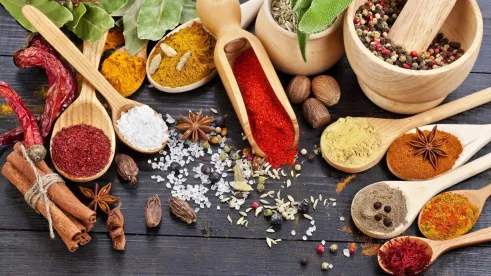We have all heard stories of lead exposure from paint. Recently, high lead levels in dark chocolate have made headlines. But have you ever considered that lead could be lurking in your spice rack? For a number of years, studies have been done to test for lead and other heavy metals in spices. Recently, the results of testing done by the Health Department of Douglas County, Nebraska revealed that spices were the second most common cause of lead poisoning in children in Douglas County in 2021.
Spices are agricultural products. Lead and other heavy metals are naturally found in soil and can be absorbed by plants. Spices can include many parts of a plant, including roots, leaves, flowers, bark, etc. Different parts of the plant can take up varying amounts of heavy metals. In addition, many spices are dried, which can concentrate whatever heavy metals have been absorbed by the plant. The Food and Drug Administration (FDA) does not currently regulate heavy metal levels in spices.
In 2021, Consumer Reports tested a number of common dried spices from a variety of name brands, including organic brands. One third of the spices tested contained levels of lead which, based upon FDA guidance regarding acceptable levels of lead exposure, could present health concerns in children, and, with some of the spices tested, even in adults. For example, all the brands of thyme and oregano tested contained levels of lead which, based upon FDA guidance, raised health concerns. Earlier studies, including a study done in New York and published in 2019 and another study done in North Carolina and published in 2018 found levels of lead in spices which, based upon FDA guidance, raised health concerns. Not surprisingly, the 2021 Consumer Reports testing resulted to several lawsuits against companies selling spices which tested high for heavy metals, including McCormick and Walmart.
Does this mean that manufacturers believe that you and your children should give up grandma’s homemade spaghetti sauce? No. Some manufacturers have developed a robust response to this question. First, there are things that can be done to help understand the risks posed by your favorite spices. An informed consumer is a wise consumer. While the FDA does not regulate heavy metal levels in spices, it does monitor their levels in various foods and can require testing. The states of New York and California have set permissible lead levels applicable to spices. The European Union has also set heavy metal limits for foods, including spices.
While the FDA does not regulate heavy metal levels in spices, it does monitor their levels in various foods and can require testing.
The American Spice Trade Association (ASTA) is a trade association that includes most of the companies who supply the majority of the spices sold in the U.S. Its goal is to “ensur[e] the supply of pure, safe spice to American consumers.” Among other things, the ASTA offers guidance to producers about Good Agricultural Practices to help minimize heavy metal uptake in spice crops. ASTA also supports the FDA establishing heavy metal limits in line with limits adopted by other international bodies.
So, what else can you do to ensure that the spices you use are not high in lead? Growing you own herbs and spices, while time consuming, is one option (but may require your own soil testing). Testing can be done to ascertain heavy metal levels in spices. Some spice and herb companies do test their products for heavy metals. A little research, either on the company itself or published testing done on their products, before you purchase can help you identify which companies’ spices have tested free of heavy metals. Finally, many of the spices sold in the U.S. are imported and are under even less oversight than U.S. companies. Spices from certain countries, when tested, have been found to contain elevated heavy metal levels. When researching your spices, try to determine the country of origin of those spices and use that information to help you decide which brands to buy. Before you enjoy that next plate of homemade spaghetti, be informed and consider the source of your spices.



 />i
/>i

